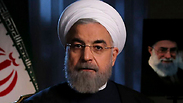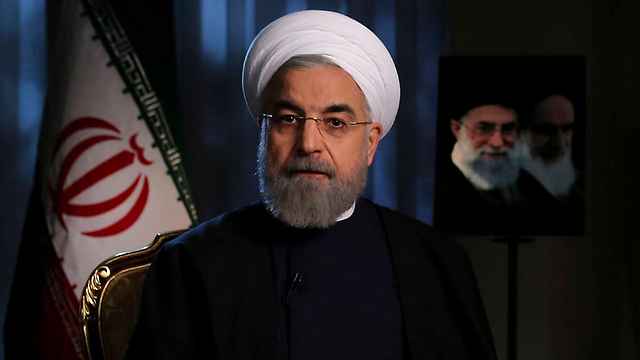
צילום: AP
Iran president promises nation will abide by nuclear deal
Hassan Rouhani vows that Iranians 'do not seek to deceive' the international community and calls on world powers to fulfill their part of the deal.
Iran's President Hassan Rouhani on Friday pledged that his nation will abide by its commitments in the nuclear agreement reached the previous day in Switzerland.
Rouhani also called on world powers to fulfill their part of the deal, a reference to further lifting of sanctions imposed on Tehran over the controversial nuclear program.
"Everything we promised in the nuclear talks ... we will remain loyal (to) and stand by our promises," Rouhani said in a speech to the nation about the framework agreement. Iranians "do not seek to deceive" the international community, he added.
After a week of grueling negotiations, Iran and the six world powers announced a series of understandings on Thursday on how to curb Iran's nuclear program. They face a June 30 deadline for a final deal that is meant to cut significantly into Iran's bomb-capable technology while giving Tehran quick access to assets and markets blocked by international sanctions.
The deal was met with criticism by Iranian hard-liners but was overwhelmingly backed by the establishment.
Iran's Foreign Minister Mohammad Javad Zarif, who negotiated the agreement in Lausanne, Switzerland, received a hero's welcome upon his arrival back to Tehran on Friday.
Crowds of cheering supporters surrounded Zarif's vehicle and chanted slogans supporting him and Rouhani. One of the chants also offered sarcastic "condolences" to both Israel and to the hard-line Kayhan newspaper, which has opposed the negotiations from the start.
Zarif tried to reassure Iranians that the country's nuclear program will continue but said any negotiation requires give and take. "It is not supposed to be one party receiving all the concessions and the other party surrendering," he said.
Zarif also expressed his gratitude for the support of Iran's Supreme Leader Ayatollah Ali Khamenei and said Thursday's understandings will be a "base for drafting the final agreement," in July.
If implemented, the deal will substantially pare back some Iranian nuclear assets for a decade and restrict others for an additional five years. It would be the first significant success for the United States and its partners in more than a decade of diplomatic efforts focusing on capping Tehran's nuclear advance.
Like Zarif, Rouhani also sought to reassure Iranians that the country will continue to enrich uranium -- something it has always insisted was for peaceful purposes only but which the U.S. and its allies suspected was a cover for pursuing nuclear arms.
"Our enrichment and entire nuclear technology is only for the development of Iran," Rouhani said. "It will not be against regional countries or against the world."
A new chapter of "cooperation with the world" will begin when the final deal goes into effect after July, Rouhani added.
"Some think we have no option except to fight the world or to surrender. But there is a third way, too. We have to have cooperation with the world," said Rouhani.
Iranian hard-liners claimed the agreement was a bargain for the West and a disaster for Iran.
"We gave up a race-ready horse and we got in return a broken bridle," Hossein Shariatmadari, a Khamenei adviser and Kayhan's chief editor, told the semi-official Fars news agency.
Another conservative analyst, Mahdi Mohammad, referred to the Fordo underground uranium enrichment facility and told the news outlet that under the deal, "a disaster happened in Fordo."
As part of the Lausanne understandings, Iran agreed to stop enrichment at Fordo and change the facility to a nuclear research center.
Another member of the negotiating team -- Ali Akbar Salehi, the head of Iran's atomic agency -- said, "I see the future very bright and shining."
Ahmad Tavakkoli, a prominent conservative lawmaker, wrote a letter to Rouhani on Thursday, saying the agreement needs ratification by the country's conservative-dominated parliament.
But supporters of the negotiations have claimed that the nuclear talks have been conducted under the direct supervision of Khamenei, and therefore don't require parliamentary approval. Khamenei, who has final say on all state matters, has not made any public comment on the deal.











